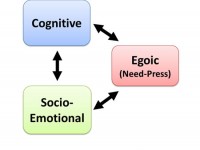In these comments on my keynote read to the June 2015 EMCC conference in Warsaw, Poland, I summarize writings on developmental coaching from my pen since 1999. I have taught this discipline to an international student body between the years of 2000 and 2015 at IDM, the Interdevelopmental Institute, and continue to practice what I have learned in this domain in work with teams and circles. Although some of my articles on developmental coaching have appeared in international journals, to this day (2018) the coaching profession -- especially ICF coaching -- has not absorbed the empirical findings from research in adult development that are the foundations of my practice of evidence-based developmental coaching. Developmental coaching in terms of the IDM Institute I founded in 2000 entails that of the two English meanings of the term development one is "agentic", and the other is "ontic". The first meaning is expressed by a sentence such as "we develop a new team", while the second is referred to in the sentence "this team is immature". In the first case, one is thinking of individuals' development in behavioristic terms, focusing on what outsiders do to support (horizontal) learning, while in the second one focuses... Read More...
Category: Developmental Coaching
Zur Durchdringung organisatorischer Beratung mit Einsichten aus CDF
In diesem Artikel fuehre ich im Einzelnen die Geschichte und die Eigenart des Constructive Developmental Framework (CDF) aus. Ich moechte zeigen wie insbesondere ein soziologischer Beratungsansatz wie New Deal (Gucher 2015), aber auch aehnliche Beratungsvorgehen, durch Einsicht in die lebenslange Entwicklung von Menschen vertieft und im Dialog mit Kunden flexibel werden koennen. Der Nachdruck im Text liegt darauf, dass alle Dimensionen von Sozialkapital -- persoenliche Beziehungen, Emotionen, Aufmerksamkeit und Wissen -- in ihrer Bestehensweise und Verwendung entschieden von dem Reifegrad von Individuen und Teams abhaengen. Dies legt nahe, die auf New Deal beruhenden Interventionen durch sozial-emotionale und kognitive Werkzeuge aus CDF zu bereichern und dadurch zu staerken. Insbesondere erhoeht man durch CDF die Dialogfaehigkeit von Gruppen und Teams und staerkt das fuer eine kollaborative Arbeitsweise notwendige gegenseitige Vertrauen. Der Artikel behandelt sowohl wie man CDF durch Gruppenarbeit am Interdevelopmental Institute erlernt und wie man das erlangte Wissen in Kundenberatung und Coaching einfuehren kann. Anfragen ueber Lehrweise und Kosten der CDF Ausbildung zur dialogischen Beratung bitte an Otto Laske, otto@interdevelopmentals.org, richten. Durchdringung des New Deal mit CDF Feb. 2018 Read More...
A Developmental Systems-Constellation Workshop for Advancing Shared Leadership in Holacratic Environments
Shared or distributed leadership in holacratic environments is often more of a hope or an advertisement than a reality. This is so because leadership is an adult-developmental issue that behavioral training methods are not equipped to handle. However, tools originating in adult-developmental research (since 1975) are still unknown or else eschewed in behaviorally thinking companies, to their own detriment. This article describes the purpose, structure, goal, and outcomes of a workshop based on the Constructive Developmental Framework (CDF). It is an initial offering for preparing a company for undertaking a series of advanced team work sessions. Parties interested in evidence-based deliberately developmental approaches to leadership are invited to contact otto@interdevelopmentals.org. Proposal for systemic constellation work Read More...
A methodology for creating a developmentally aware society
Until quite recently, the notion that adults develop over their entire lifetime has been a well kept academic secret. It still is. Attempts at establishing “deliberately developmental organizations” (DDO’s; Kegan & Lahey 2016), based on 40 years of research in adult development, are quite recent. This article introduces to the Constructive Developmental Framework (CDF), a synthesis of adult-developmental research since 1975 that has been taught as well as practiced at the Interdevelopmental Institute since 2000 (). CDF is a new tool for understanding how people experience life and work, mostly without full consciousness. This qualitative understanding emerges from semi-structured 1-hour interviews which shed new light on how people construct their workplace internally, both individually and in teams. CDFs main strength in business lies in providing new tools for boosting, through dialog, two human capabilities: making meaning of experiences (called “social-emotional”) and making sense of the real world conceptually (referred to as “cognitive”), as further explained below. Viewed more broadly, CDF comprises a political dimension as well. It is a framework for coaching for society, in the sense of developing self-authoring citizens who can think independently, rather than in dependence on internalized or external others. At the present time, where algorithms... Read More...
A New Era Begins at the Interdevelopmental Institute, Gloucester, MA, USA (IDM)
As the Interdevelopmental Institute (IDM) enters a new era, it wants to communicate what it has learned and what, based on its learning over nearly 20 years, it can now deliver to CEOs and Boards. Find out how the Institute's main methodology, called Constructive Developmental Framework (CDF), addresses contemporary issues such as the digital transformation of businesses in all of its facets. Take note of the critical realism CDF tools embody (thanks to Roy Bhaskar's work on a dialectical ontology), and IDM's critical theory practice that now provides a new home for Frankfurt School insights just in time ... Sincere thanks to the international community of students who have made IDM widely known through their own work over many years! A New Beginning at IDM Read More...
What Everybody is Losing Out On by Bypassing 40 Years of Research on Adult Development
There is a vast lack of knowledge about how one's own level and phase of development as an adult uncanningly and forcefully causes the kind of suffering one feels most keenly. This short article is meant as a pointer to what is missing in all of the "helping" literature and the well-meant helping activities in a society which continues to be characterized by master-slave relationships in a multitude of forms. What is everybody losing out on Read More...
